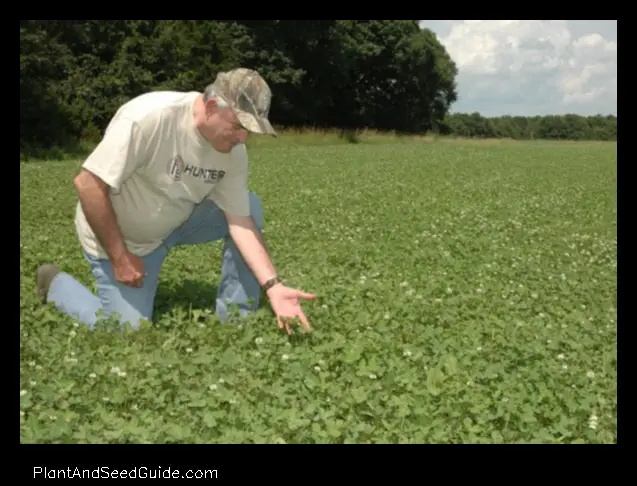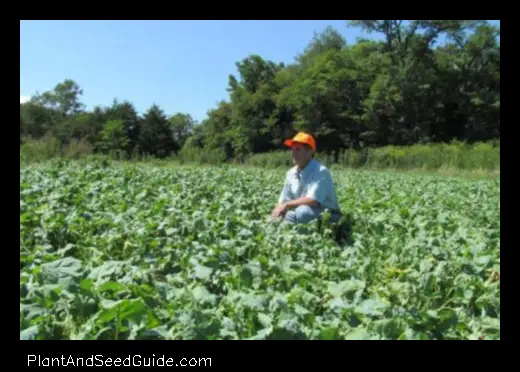
1.
2. Benefits of planting clover for deer
3. Choosing the right type of clover
4. Preparing the soil
5. Planting clover seeds
Loading... Seconds Left for
Miniature Orchid Terrarium Gallery!

6. Watering and fertilizing clover
7. Managing clover growth
8. Harvesting clover
9. Deer-pro
ofing your clover planting
10. FAQ
| Topic |
Features |
| Clover food plot |
Attracts deer, provides forage, improves soil |
| How to plant clover |
Choose the right type of clover, prepare the soil, plant the seeds, water and fertilize |
| Clover benefits |
Attracts deer, provides forage, improves soil |
| Clover planting guide |
Choose the right type of clover, prepare the soil, plant the seeds, water and fertilize |
| Clover seeding rate |
1-2 pounds of clover seed per acre |

Clover is a great food source for deer, and it can provide a number of benefits for your deer herd. These benefits include:
- Clover is a high-quality forage that is rich in protein and nutrients.
- Clover helps to improve soil quality by adding nitrogen and other nutrients.
- Clover provides shelter and cover for deer.
- Clover helps to attract other wildlife, such as turkeys and quail.
If you are interested in planting clover for deer, there are a few things you need to keep in mind. First, you need to choose the right type of clover for your area. There are many different types of clover, and some are better suited for certain climates than others. Second, you need to prepare the soil properly before planting. Clover does best in well-drained soil that is rich in nutrients. Third, you need to plant the seeds at the right time of year. Clover seeds should be planted in the spring or fall. Finally, you need to water and fertilize the clover regularly to ensure that it grows well.
3_Choosing_the_right_type_of_clover">3. Choosing the right type of clover
There are many different types of clover, but not all of them are suitable for planting as a food plot for deer. The best types of clover for deer include white clover, red clover, and crimson clover. These types of clover are high in protein and nutrients, and they are also palatable to deer.
When choosing a type of clover for your food plot, it is important to consider the climate and soil conditions in your area.
White clover is a cool-season legume that does well in most climates, while red and crimson clover are warm-season legumes that are best suited for warmer climates..
It is also important to consider the amount of sunlight that your food plot will receive. White clover and red clover can tolerate partial shade, while crimson clover requires full sun.
Once you ha
ve considered the climate, soil conditions, and amount of sunlight in your area, you can choose the best type of clover for your food plot.
4. Preparing the soil
The first step in planting clover is to prepare the soil. Clover does best in well-drained soil that is rich in organic matter. If your soil is not well-drained, you can improve drainage by adding compost or sand. You can also add organic matter to the soil by spreading a layer of mulch around the planting area.
Once you have prepared the soil, you can begin planting clover seeds. Clover seeds are very small, so it is important to spread them evenly over the planting area. You can use a seed spreader or simply sprinkle the seeds by hand.
After you have planted the seeds, you should water the area thoroughly. The seeds need to be kept moist in order to germinate. You should water the area regularly until the seedlings have emerged and are established.
5_Planting_clover_seeds">5. Planting clover seeds
To plant clover seeds, you will need:
- Clover seeds
- A rake
- A hoe
- A watering can
To plant the seeds, follow these steps:
- Rake the soil to loosen it up.
- Sprinkle the seeds evenly over the soil.
- Cover the seeds with a thin layer of soil.
- Water the seeds thoroughly.
The seeds will germinate in about 1-2 weeks.
6. Deer-proofing your clover planting
Deer are attracted to clover, so it is important to take steps to protect your planting from them. Here are a few tips:
- Use a deer-resistant variety of clover.
- Install a deer fence around your planting.
- Use repellents or deterrents to keep deer away from your planting.


